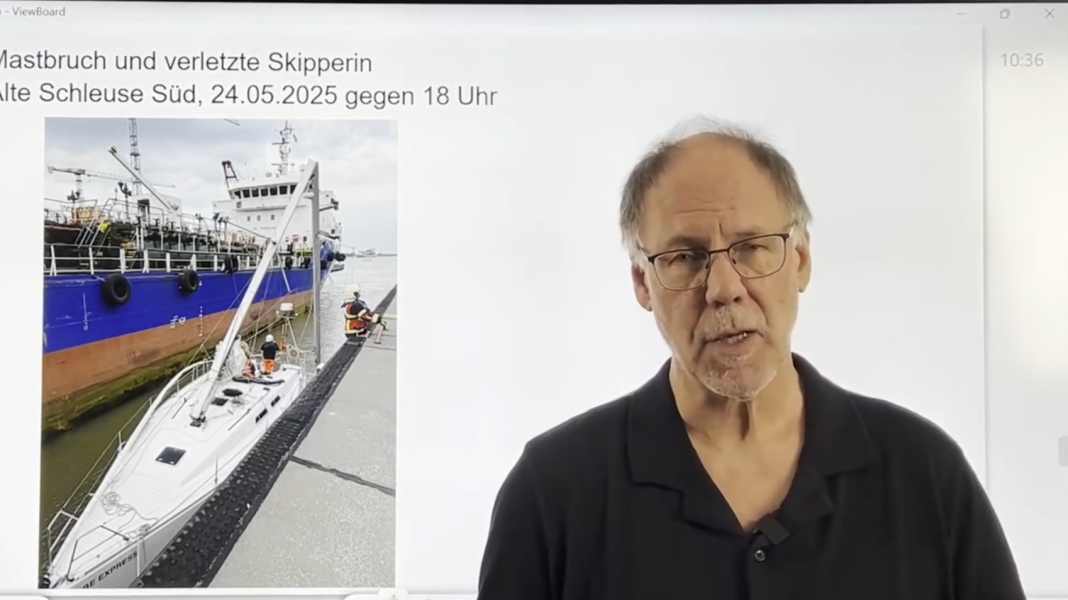
On 24 May 2025, the Varianta 37 "Elbe Express", a training boat belonging to the Eichler Yacht Schoolin the old lock in Brunsbüttel with a 100 metre tanker, whereby the mast broke off and trapped the skipper (we reported). The woman was taken to hospital with a broken rib.
The incident raises questions about the safety of locking pleasure craft and large ships at the same time. Eichler has now published a comprehensive Video on Facebook commented on the accident. According to the statement, he, who has over 40 years of professional experience, had feared such an accident for a long time.
The video
At this point, you will find external content that complements the article. You can display and hide it with a click.
Cramped conditions in the lock
The incident occurred in the narrow lane between the tanker and the lock wall, which often leaves only a few metres of space for pleasure craft. The old lock in Brunsbüttel was built over 100 years ago during the construction of the Kiel Canal. With a usable width of just 22 metres, there is little room for sailing boats next to a 16-metre-wide tanker. In this particular case, only 6 metres remained, of which the pleasure craft already took up 4 metres.
Dangerous screw water
Eichler cites the tanker's screw water as the main cause of the accident. The tanker had moored to the lock wall with a bow and held its position by travelling slightly forwards. This technique is common in commercial shipping, but creates strong water turbulence. "The difficulty is that it is very difficult to see the swirling of the water," explains Eichler. A carbon racing yacht travelling ahead had already been heavily displaced, but was still able to master the passage.
There was no time left for the following skipper of Eichler's boat to abort the manoeuvre. "Then, just like in aviation, you go through with the manoeuvre," emphasises Eichler. Aborting the manoeuvre in the swirling propeller water would have left the yacht completely at the mercy of the current. The experienced skipper tried to steer the boat through the narrow passage, but collided with the tanker. The rigging got caught in protruding fender tyres. The mast broke and the skipper was injured.
The Brunsbüttel fire brigade was quickly on the scene and used a turntable ladder to rescue the injured skipper from the damaged sailing boat. She was flown to hospital by rescue helicopter. The rest of the crew were able to secure the damaged boat. Eichler's employee Svenja took care of the crew that same evening and dealt with all the necessary formalities with the authorities and insurance companies.
Discussion about security measures
The accident raises questions about the safety of joint locks for commercial and pleasure craft. Eichler emphasises: "It would be extremely sensible to take this as a warning. The steamer is using the propeller." Better communication between large ships and pleasure craft could help to avoid such dangerous situations. A separate lock is also being discussed as a possible solution.
Eichler sees no culpability on the part of those involved. "That is my conviction. And after the internal analyses of what happened, we have established for ourselves that we would have done exactly the same as this woman that we have deployed here in this case," he explains. The Federal Bureau of Maritime Casualty Investigation has already declared that it will not investigate the case any further.
Consequences for the future
As an immediate consequence, Eichler has instructed his skippers to explicitly enquire about screw water if they are unsure and, in case of doubt, not to enter the harbour. "Then we just wait an hour," he emphasises. In the long term, there needs to be a discussion about safer lock procedures for pleasure craft. Eichler hopes that the incident will serve as an impetus to improve safety in the narrow and busy locks of the Kiel Canal.

Lars Bolle
Chief Editor Digital
Lars Bolle is Editor-in-Chief Digital and one of the co-founders of YACHT's online presence. He worked for many years as an editor in the Sports and Seamanship section and has covered many sailing events. His personal sailing vita ranges from competitive dinghy sailing (German champion 1992 in the Finn Dinghy) to historic and modern dinghy cruisers and charter trips.

